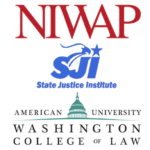Legal Rights Overviews and Brochures Multilingual Materials for Victims and Advocates DHS Infographic: Protection for Immigrant Victims (January 12, 2107) Immigration Options for Victims of Crime – DHS Brochure VAWA Confidentiality: Improving Victim Safety Webpages and Webinars VAWA Confidentiality Protections for Immigrant Crime Victims VAWA Confidentiality Webinar Enhanced Safety Planning for Immigrant Survivors of Domestic […]
*Training Materials: VAWA Confidentiality Protections (Last Updated – February 2018)

